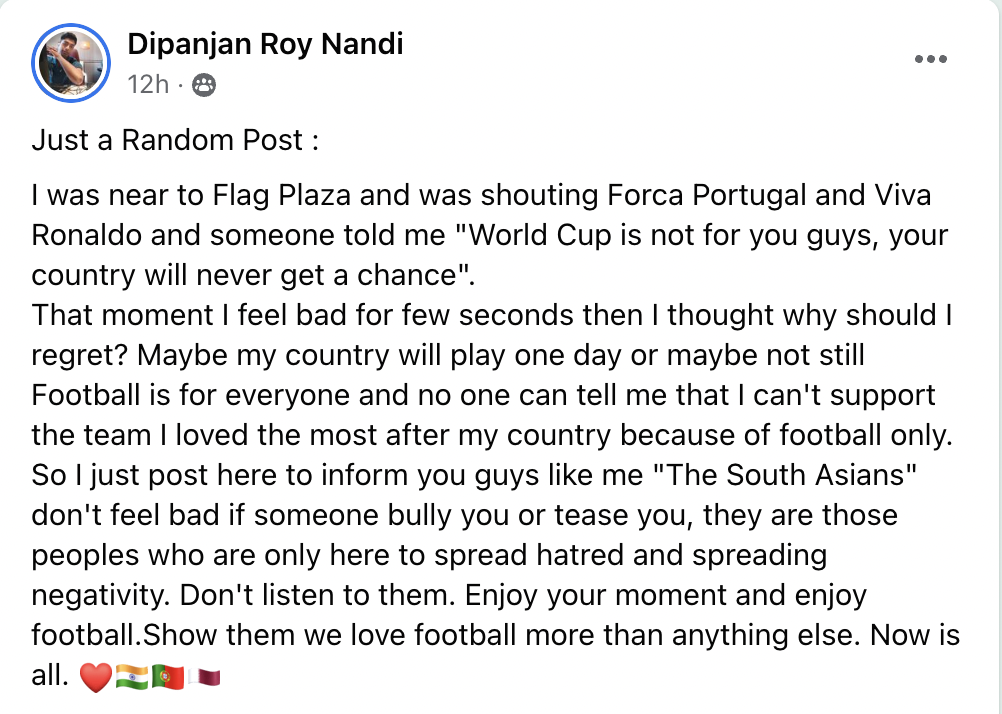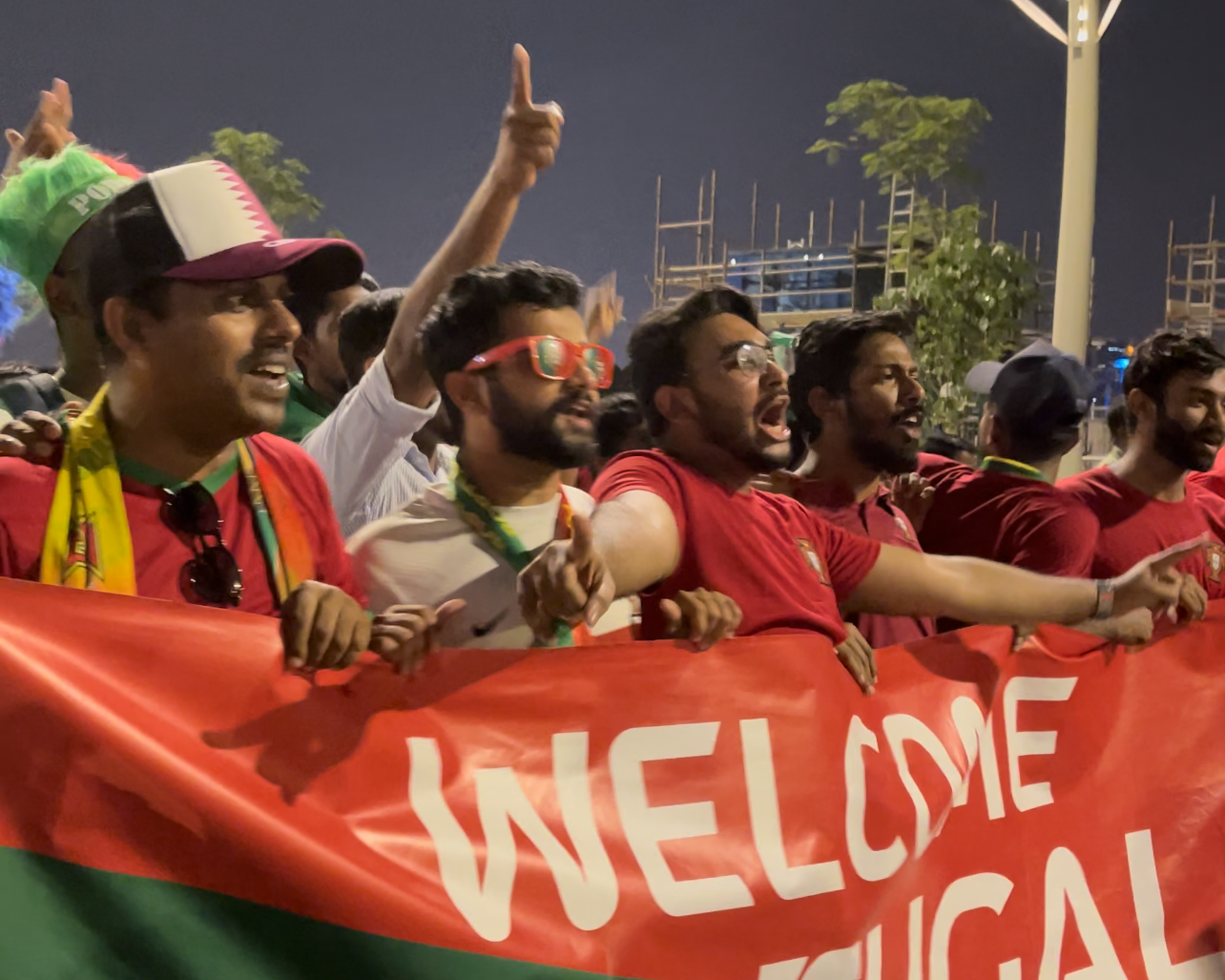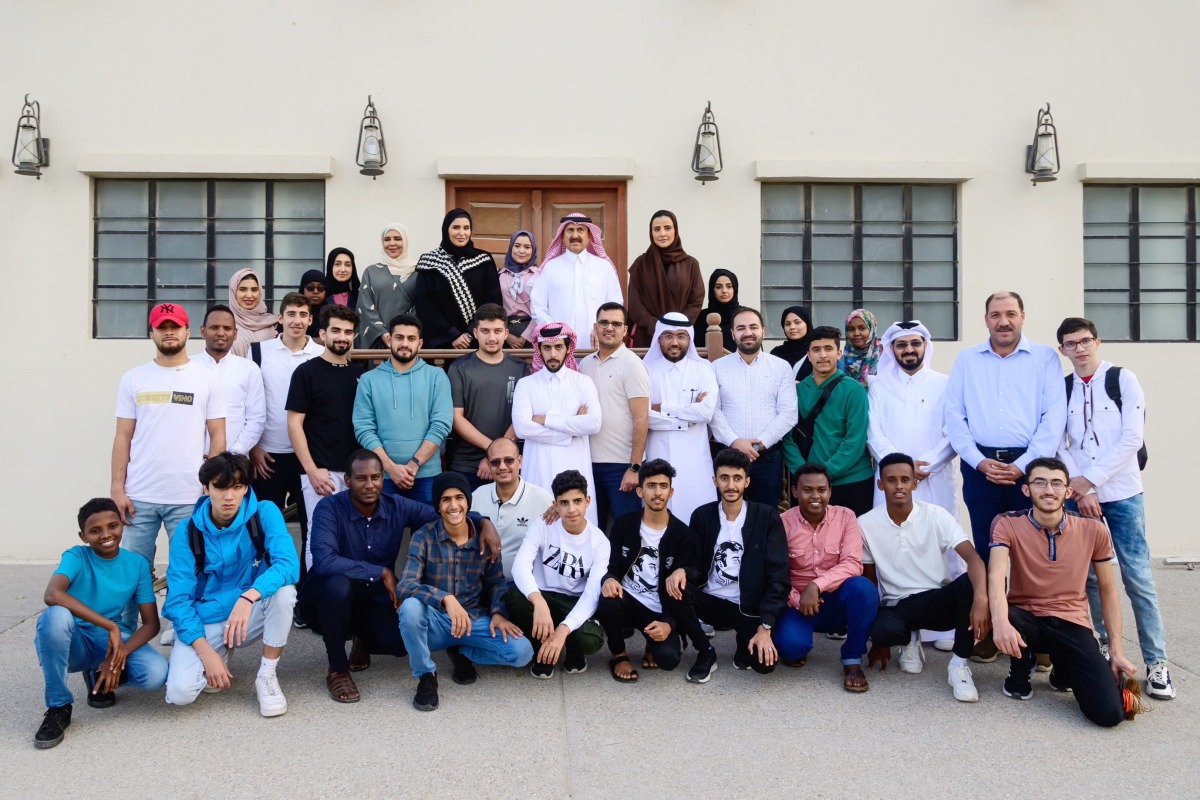Following the appearance of several Southeast Asian fans, mostly Indians, in videos from the Brazil and Argentina fan parades in Doha this week, accusations that Qatar hired “fake” football fans have inundated the internet.
British media reports claim authorities in the Gulf state have paid thousands of migrant workers to take to the streets in a bid to drum up celebrations in the week leading up to the World Cup, questioning the “legitimacy” of South East Asian supporters.
At a meeting with European officials in Brussels earlier this week, Qatar’s Minister of Labour Dr. Ali bin Samikh Al Marri briefly spotlighted the issue saying “some politicians and some media outlets in Western countries have lost the moral and professional motive in their attack against Qatar”.
“His Excellency pointed out that the false slander campaign transgressed all limits in its attempt to discredit Qatar, the latest of which was the claim that the World Cup organisers used fake fans who receive money to attend the matches,” state-run Qatar News Agency reported.
On the ground in Qatar, the ‘paid fans’ allegations have been denounced by football fans who spoke to Doha News.
“Accusations that the fans in the parades were paid to show up are exactly what it is, an accusation and it’s not something anyone should waste time investigating. Paid or not, it all created an atmosphere that suits such an event and that’s what matters,” Sminto Antony, an Indian man from Kerala who has lived in Qatar for 33 years, told Doha News.
This week, various fan groups across Qatar held mass rallies across the capital in the build up to the FIFA World Cup Qatar 2022, scheduled to kick off on November 20. The parades, organised by local football fan groups of different national teams, including Qatar, England, Brazil, Argentina among others, drew in large crowds along the Corniche and at the newly-opened Lusail Boulevard.
Footage that emerged online showed a large number of South East Asian football fans, many of whom donned football shirts of the countries they were out to support. Members of the South Eastern community in Qatar make up the majority of Qatar’s overall population. The Indian population alone exceeds some 750,000 – making up about 25% of the country’s overall population of 2,979,915.
In comparison, native Qataris make up just 15% of the population. Such figures appear to be missed by British and Western tabloids, which have over the last few years, and in particular the last few weeks, engaged in a ferocious campaign taking aim at Qatar’s hosting of the World Cup.
This year’s edition of the FIFA World Cup is the first such tournament to be hosted in the Middle East for the first time in its history, and Qatari officials say the continuous attacks against the first World Cup in the Arab and Muslim world is largely due to racism.
Earlier this month, the Chief Executive Officer of Qatar 2022 Nasser Al-Khater said the campaign against Qatar and its hosting of the 2022 FIFA World Cup is linked to Europe’s refusal to see a country outside its region take on the tournament.
“European countries feel they have monopoly over the World Cup. Europe has hosted 11 tournaments out of 22 tournaments, of course it refuses that a country like Qatar or an Arab Muslim country hosts a tournament like the World Cup,” Al-Khater told Al Jazeera Arabic in a televised interview.
Ironically, reporting by Western media has taken aim at Qatar’s human rights record, with particular emphasis on its treatment of migrant workers.
Football fans who spoke to Doha News say such coverage of the football parades showcases an ongoing and general lack of understanding about the demographic makeup of Qatar, the migrant workers they pretend to protect, and the existence of football fans beyond European borders and lenses.
In a statement by the Supreme Committee for Delivery and Legacy, authorities said they “thoroughly reject” the allegations.
“Fans from all over the world – many of whom have made Qatar their home – have contributed to the local atmosphere recently, organising fan walks and parades throughout the country, and welcoming the various national teams at their hotels,” the statement said.
“Numerous journalists and commentators on social media have questioned whether these are ‘real’ fans. We thoroughly reject these assertions, which are both disappointing and unsurprising,” it added.
The statement highlighted Qatar is comprised of a diverse range of football fans, many of whom share emotional connections with multiple nations.
“In different places around the world, fans have different traditions, different ways to celebrate, and while that may contrast with what people are used to in Europe or South America, it doesn’t mean the passion for football is any less authentic,” the statement noted.
While Western media may have missed Qatar’s population statistics in their reporting of the parade, the racist targeting of South East Asian fans has appeared to rear its ugly head online, too.
In a Facebook post shared online, one Indian fan took to a popular expat group to talk about his experience while cheering for his favourite team, Portugal.

“I was near Flag Plaza and was shouting Forca Portugal and Viva Ronaldo and someone told me ‘World Cup is not for you guys, your country will never get a chance’. That moment I felt sad for a few seconds then I thought why should I regret?” he wrote on the post.
“Maybe my country will never play..but football is for everyone and no one can tell me that I can’t support the team I loved the most,” he added, urging other “South East Asians like me” to not feel bad if they face bullying.
“Enjoy your moment and enjoy football. Show them we love football more than anything else,” he added.
Meanwhile, one fan tweeted: “I’ve been eagerly waiting for the World Cup and was happy that it was nearby in Qatar, only to find out that the Argentinian and Brazilian fans are all Indian. What is this luck? Can I refund my tickets and accommodation or is it too late?”
In another outrageous tweet, one person said he was hoping to get a glimpse of “beautiful Brazilian women and samba dancers.”
The comments became more apparent when videos surfaced of Tunisian fans in Qatar greeting their national team, with many saying “finally some real fans”.
Responding to such comments, Antony did the maths.
“There are about 20,000 Tunisians living in Qatar and hence they showed up like they did. I don’t think there are as many Germans, Argentinians, Spaniards, Brazilians, etc. living as expats in Qatar, but they do have a strong fan base who showed up to make up for it, which happened to be Indians mostly from Kerala, ” said Antony.
In the lead up to Argentina’s match against Italy earlier this year, the group Argentina Fans Qatar (AFQ) was established.

The story of ardent Argentina supporters from a variety of nationalities, primarily Indian, Nepalese, Sri Lankan, and Bangladeshi, as well as Africans and Qataris, is told through the local Argentina Fans Qatar (AFQ).
The group was established in the lead up to Argentina’s match against Italy earlier this year, providing a platform for avid fans keen on getting together for matches and talking all things football.
“A real football fan I believe is someone who got love for the sport and the teams immaterial of which country they belong to,” Antony told Doha News.
Kerala’s football fever
“Indians, especially those from Kerala, have been huge supporters of the sport that is football, immaterial of which country the football team belongs to. And this is the case back in Kerala too and not just in Qatar,” said Antony, who is originally from Kerala.
Cutouts of three of football’s all-time greats were seen earlier this month in Pullavoor, Kerala, capturing the peak of the sport’s frenzy in a state that has already started preparing itself for the FIFA World Cup.
Pullavoor, a village of locals who previously worked in the Gulf region, has been largely divided in recent years over its support for Brazil’s Neymar and Argentine’s Messi in football, but it never changed the fact that everyone there was united by one goal: enjoying football.
Many of them still have the same competitive attitude for football in Kerala, and they were merely spreading it to the host nation of Qatar.
The opening match of the FIFA World Cup Qatar 2022 pits the host nation Qatar versus Ecuador at the Al Bayt Stadium on November 20.
For the month-long competition, more than 1.2 million tourists are anticipated to swarm to Qatar.

















Leave a Reply